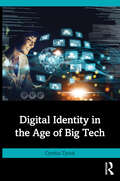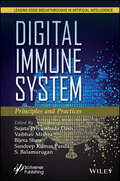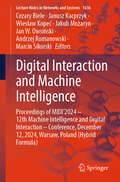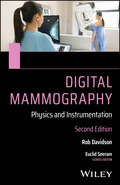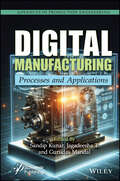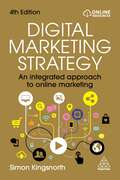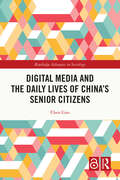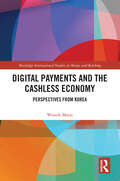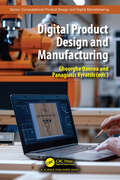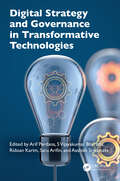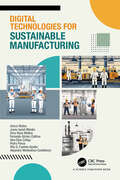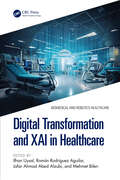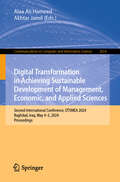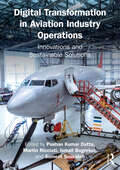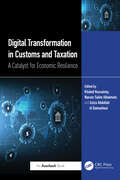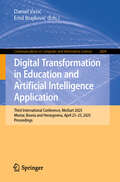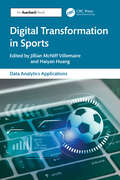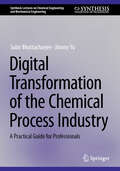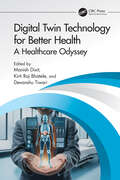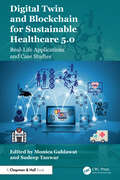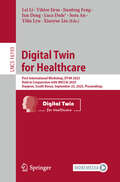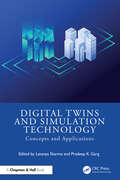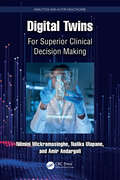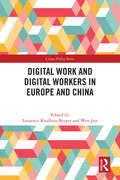- Table View
- List View
Digital Identity in the Age of Big Tech
by Cynthia TysickAn accessible introduction to the technical and social construct of digital identity, this book helps students understand how the data they generate through online activities and apps is used and the implications it can have.Each of us has a digital identity, compiled of multiple identities, which has been built over the years as we have interacted with various technologies and apps. This book explores how the data generated through these online activities is used by third parties to form our digital identity and how this identity can then determine where we live, what job we have, what we buy, who we vote for, what healthcare we can access, and much more. Featuring real-world examples, discussion questions, and activities throughout, the book aims to help students understand the impact of their digital identity on everyday life. By understanding how technologies are used by apps, businesses, governments, and third parties, they can then begin to manage their digital identity and regain control of the way they are represented to the world.An important guide to digital identity for undergraduate students, this book will be especially useful to those studying topics such as big data and society, digital literacy, media and communication, social media and society, and beyond.
Digital Immune System: Principles and Practices
by Sandeep Kumar Panda S. Balamurugan Vaibhav Mishra Sujata Priyambada Dash Bijeta ShawEquip yourself with the knowledge to build a resilient digital infrastructure by understanding how the digital immune system leverages advanced technologies to proactively defend against cyber threats. The concept of the digital immune system represents a significant advancement in cybersecurity, reflecting the industry’s shift toward more intelligent and adaptive defense mechanisms. Drawing inspiration from biological immune systems, the digital immune system offers a solution that naturally adapts and responds to evolving threats. This book explores this evolving landscape, focusing on the integration of advanced technologies like artificial intelligence, machine learning, and automation to build resilient digital infrastructures. It delves into how these technologies can create a self-sustaining ecosystem that detects, responds to, and mitigates cyber threats in real-time and highlights the significance of predictive analytics and behavioral analysis in identifying potential threats before they materialize. Through case studies and real-world examples, the book demonstrates how organizations have successfully implemented digital immune systems to protect their assets and maintain operational integrity in an increasingly hostile digital environment. Additionally, the book addresses the challenges and ethical considerations involved in deploying a digital immune system. It discusses the balance between security and privacy, the potential for false positives, and the need for transparency in automated decision-making processes. By providing a comprehensive overview of the current state and prospects of digital immunity, the book serves as a crucial resource for cybersecurity professionals, IT leaders, and anyone interested in understanding the next-generation of digital defense mechanisms. Readers will find the book: Introduces the emergence of the digital immune system; Discusses different applications of the digital immune system across various industries; Comprehensively covers the fundamentals of the digital immune system for different domains, presenting state-of the-art analysis and real-world case studies; Examines the importance of a proactive approach to cybersecurity, emphasizing the need for organizations to move beyond traditional reactive measures. Audience Research scholars in computer science and AI, IT professionals, network administrators, cybersecurity and blockchain technology experts, engineering students and government research agencies looking to the future of cybersecurity.
Digital Interaction and Machine Intelligence: Proceedings of MIDI’2024 – 12th Machine Intelligence and Digital Interaction – Conference, December 12, 2024, Warsaw, Poland (Hybrid Formula) (Lecture Notes in Networks and Systems #1636)
by Janusz Kacprzyk Jan W. Owsiński Cezary Biele Andrzej Romanowski Marcin Sikorski Wiesław Kopeć Jakub MożarynThis book presents the Proceedings of the 12th Machine Intelligence and Digital Interaction Conference, and it combines two disciplines of research. The rapid progress in artificial intelligence research and the widespread use of interactive technologies are fundamentally changing our daily lives. This has given rise to new social dynamics, compelling nations around the world to develop new insights and strategies. Addressing these changes effectively demands a multidisciplinary strategy, uniting experts from AI and human-computer interaction with both academic researchers and industry practitioners. The proceedings from the 2024 MIDI conference offer the latest research on the convergence of these two formerly separate fields.
Digital Mammography: Physics and Instrumentation
by Rob DavidsonAn authoritative and up-to-date discussion of digital mammography fundamentals The newly revised second edition of Digital Mammography: Physics and Instrumentation delivers an expert discussion of all things digital mammography. From an explanation of how mammography plays an important role in cancer detection and treatment to practical discussions of mammography image formation, you’ll find analysis of the most recent advances in digital breast tomosynthesis and photon counting mammography. Readers will also discover: Complete treatments of mammographic instrumentation and physicsA thorough introduction to image quality optimization techniquesComprehensive explorations of new artificial intelligence applications in mammographyValuable information about how radiation dose is relevant to patient safety and diagnostics Perfect for mammography radiologic technologists and diagnostic radiographers, Digital Mammography: Physics and Instrumentation will also benefit breast clinicians, trainee radiologists, and students of medical imaging and radiography.
Digital Manufacturing: Processes and Applications (Advances in Production Engineering)
by Sandip Kunar Jagadeesha T. Gurudas MandalDrive innovation and efficiency in your manufacturing processes with this comprehensive guide that explores the transformative impact of digital manufacturing technologies, from robotics to Industry 4.0. Digital manufacturing refers to the use of a computer-based system consisting of various tools and software for simulation, analytics, 3D visualization, and business and manufacturing collaboration. Often, these tools and software programs are cloud-based. They enable a manufacturer to connect and integrate manufacturing operations into a streamlined whole. With this centralized computer system, manufacturers have a seamless, connected flow of data related to all their processes and products. This comprehensive volume explores the transformative impact of digital technologies on the manufacturing industry. It delves into the core concepts of digital manufacturing, including automation, additive manufacturing, robotics, digital twins, and Industry 4.0. Covering both the theoretical foundations and practical applications of these technologies, this book provides a detailed understanding of how these technologies are reshaping production processes, improving efficiency, and driving innovation. It highlights the challenges and opportunities of adopting these advancements in the context of modern manufacturing environments. With real-world case studies and insights from industry experts, this book serves as an essential resource for professionals, students, and researchers aiming to understand and implement digital manufacturing solutions. Readers will find the volume: Introduces technologies for successful improvement in advanced processes and applications of digital manufacturing;Explores recently developed digital manufacturing technologies;Discusses the successful fabrication of multipurpose digital manufacturing technologies, the sustainability of digital manufacturing technologies, and the future scope and challenges presented by digital manufacturing technologies. Audience Engineers, researchers, academics, and industry professionals invested in digital manufacturing technologies.
Digital Marketing Strategy: An Integrated Approach to Online Marketing
by Simon KingsnorthReady to develop and implement a digital marketing strategy that elevates your career?Digital Marketing Strategy is a practical guide designed for mid-career professionals seeking to build credibility and lead with confidence. Written by marketing expert Simon Kingsnorth, the fourth edition of his top-rated manual offers detailed models and frameworks to help you apply strategic principles across AI integration, marketing automation and digital analytics. With fresh real-world examples and actionable tools, it empowers you to optimize your digital marketing efforts and deliver measurable impact.You'll learn how to: - Develop a strategic digital marketing plan using proven frameworks- Implement AI-driven tools to enhance campaign efficiency- Optimize marketing performance with data-backed decision making- Build career credibility through advanced digital marketing skills- New to this edition: Use AI to build a strategy, the metaverse, Web3 and NFTs, plus updates to data points, platform features and real-world examplesWith comprehensive chapters and supportive online resources, this guide equips you to navigate emerging digital trends while driving tangible results in your organization and career.Themes include: Digital marketing strategy, AI integration and marketing automation, Practical frameworks and tools, Career development and impact, Real-world case studies
Digital Media and the Daily Lives of China’s Senior Citizens (Routledge Advances in Sociology)
by Chen GuoGuo provides a comprehensive outlook of how digital media is transforming the daily lives of senior citizens in China.The book explores the important role digital media play in senior citizens’ daily lives and the disparities of third agers’ digital well-being. It applies the concepts of digital capital and individualisation to China and uses a combination of qualitative research including interviews with seniors and focus groups, with recent data on media use, aging, and demography. Its fieldwork with seniors conducted in a second-tier city of China provides insights on how the process of digitalisation has transformed seniors’ daily lives.A valuable book for scholars and researchers in sociology, digital media, active aging population, gerontology, and China studies.
Digital PCR: Methods and Protocols (Methods in Molecular Biology #2969)
by Guillaume PavlovicThis detailed volume explores digital polymerase chain reaction (dPCR), a third generation PCR technology that enables absolute quantification by counting positive and negative partitions after endpoint amplification. The book aims to provide an overview of the various possibilities currently available, both in terms of instrumentation and applications. The selected protocols cover a wide range of uses, including fundamental research, preclinical studies, human applications, and regulatory contexts. Additionally, protocols that further extend potential applications, such as protein detection, the development of custom dPCR systems, and alternative PCR strategies like hpPCR, which, while not digital, are relevant in similar contexts, are covered. Written for the highly successful Methods in Molecular Biology series, chapters include introductions to their respective topics, lists of the necessary materials and reagents, step-by-step and readily reproducible protocols, and tips for troubleshooting and avoiding known pitfalls. Authoritative and practical, Digital PCR: Methods and Protocols serves as an ideal guide to this mature technology that will continue to enhance target quantification, notably through its multiplexing capabilities, tolerance to inhibitors, and increased precision.
Digital Payments and the Cashless Economy: Perspectives from Korea (Routledge International Studies in Money and Banking)
by Woosik MoonAgainst the backdrop of high Internet penetration and smartphone use, coupled with the widespread diffusion of credit cards, Korea has been leading the digital payment revolution, transforming itself into a cashless society.Woosik Moon analyses the current and future development of digital payments and methods in Korea, ranging from CBDC, Internet banking, payment cards, and digital wallets to crypto-assets. Moon explores a wide variety of new issues, covering not only digital payments instruments and the digital industry but also the policy actions of the government and the Bank of Korea. He argues that Korea may eliminate coins from circulation through adoption of alternative digital instruments and methods, which is an important transitional stage towards a paper-free cashless society.Offering a comparative perspective to existing studies of digital payments in US and China, this book will interest researchers and students in the field of monetary economics, financial innovation, and comparative economics.
Digital Product Design and Manufacturing (Computational Product Design and Digital Manufacturing)
by Panagiotis Kyratsis Gheorghe OanceaDigitalization concepts and methods have, in recent times, drawn the interest of researchers and academics, especially in design and manufacturing. Modern product design integrates advanced CAD/CAE/CAPP/CAM/PLM and computational tools as a means to automate tasks and increase the quality of the designed product, while reducing manufacturing cost and the time-to-market. The same is true that in the era of artificial intelligence, digital manufacturing is a fast-expanding focus of research that includes not only pure manufacturing topics but also additive manufacturing, reverse engineering, simulations of material properties for strength, manufacturability, and optimization of manufacturing processes.The book aims to cover digital tools and methods that offer additional advantages for designing and manufacturing products in a variety of industries. Furthermore, the book reviews green digital design and green digital manufacturing in the context of a circular economy.
Digital Strategy and Governance in Transformative Technologies
by Aashish Srivastava Ridoan Karim Arif Perdana S Vijayakumar Bharathi Saru ArifinDigital Strategy and Governance in Transformative Technologies offers a comprehensive exploration of how emerging technologies are reshaping business operations, governance structures, and societal interactions. This timely volume examines the complex interplay between digital strategies and governance frameworks across AI, blockchain, cryptocurrencies, and the metaverse. It provides crucial insights for navigating the digital frontier.The book’s strength lies in its multifaceted approach, moving from foundational concepts to specialized applications. It begins by examining technological convergence challenges and strategic foundations, then delves deep into pressing issues such as AI ethics in healthcare and law enforcement, blockchain’s role in fostering trust and accountability, cryptocurrency regulation, and the legal implications of the metaverse. The authors address critical questions about the ethical deployment of digital technology, blockchain transparency, cryptocurrency governance, and virtual space regulation through detailed case studies and empirical research. What sets this book apart is its balanced treatment of both theoretical frameworks and practical applications. The authors do not just explore technological capabilities; they examine how these innovations intersect with ethical considerations, regulatory compliance, and sustainable practices. From analyzing Meta’s political ad policies to examining e-waste management in the digital era, the book offers actionable insights for policymakers, business leaders, and practitioners.This essential resource serves as a guide for organizations and institutions grappling with digital transformation challenges. Whether you are a technology strategist, policymaker, academic researcher, or business leader, this book provides the framework and insights needed to develop effective digital strategies while ensuring responsible governance in an increasingly complex technological landscape.
Digital Technologies for Sustainable Manufacturing
by Arturo Molina Pedro Ponce Alex Elías Zúñiga Dora Iliana Medina Fernando Gómez Zaldívar Juana Isabel Méndez Rita Q. Fuentes-Aguilar Alejandro Montesinos-CastellanosDigital Technologies for Sustainable Manufacturing provides a practical framework for promoting sustainability in manufacturing by combining Life Cycle Engineering with the 5S principles (Social, Sustainable, Sensing, Smart, and Safe). This book introduces ten core digital technologies—including AI, simulation tools, IoT, digital twins, additive manufacturing, CAD tools, blockchain, cloud computing, AR/VR, and robotics and automation—as vital drivers for fostering innovation and resilience across materials, products, processes, manufacturing systems, and supply chains. Each chapter blends theory with real-world case studies and shows how competitive intelligence helps stakeholders anticipate trends and make strategic decisions. This comprehensive book prepares engineers, scientists, and leaders to create a more sustainable, efficient, and future-ready manufacturing ecosystem.
Digital Transformation and XAI in Healthcare (Biomedical and Robotics Healthcare)
by Ilhan Uysal, Román Rodríguez Aguilar, Jafar Ahmad Abed Alzubi, and Mehmet BilenThis book explores the pivotal role of explainable artificial intelligence (XAI) in driving digital transformation within the healthcare sector, providing comprehensive insights into its applications, ethical and legal considerations, technological requirements, and future trends.Digital Transformation and XAI in Healthcare delves into the fundamental role of XAI in transforming healthcare, addressing critical issues such as data security, ethical considerations, and the integration of XAI into existing healthcare infrastructures. By offering a comprehensive overview of technological tools, infrastructure requirements, and legal frameworks, this book equips healthcare professionals with the knowledge to navigate the complexities of XAI applications. The book explores the future of healthcare education and the pivotal role of XAI in training the next generation of healthcare professionals. It discusses how XAI can enhance learning experiences and provide more personalized education, ensuring that future clinicians are well equipped to utilize advanced AI technologies. It also delves into the technological tools and infrastructure required for implementing XAI, as well as data management and privacy concerns. The exploration of global collaborations and innovative projects highlights the book's unique perspective on the international impact of XAI in healthcare.Intended for healthcare professionals, researchers, and students, this book will provide valuable insights into the future of healthcare technology. Readers will be equipped with the knowledge to harness the power of XAI, ensuring that AI systems are not only accurate but also transparent, trustworthy, and ethically sound.
Digital Transformation in Achieving Sustainable Development of Management, Economic, and Applied Sciences: Second International Conference, DTSMEA 2024, Baghdad, Iraq, May 4–5, 2024, Proceedings (Communications in Computer and Information Science #2614)
by Akhtar Jamil Alaa Ali HameedThis book constitutes the revised selected papers of the Second International Conference on Digital Transformation in Achieving Sustainable Development of Management, Economic, and Applied Sciences, DTSMEA 2024, held in Baghdad, Iraq, during May 4–5, 2024. The 42 full papers included in this book were carefully reviewed and selected from 141 submissions. The papers included in this book were organized in topical sections on Accounting, Finance, and Economic Sustainability; Banking, Digital Transformation, and Financial Technology; and Economic Development, Sustainability, and Technological Innovation.
Digital Transformation in Aviation Industry Operations: Innovations and Sustainable Solutions
by Pushan Kumar Dutta Ismail Bogrekci Martin Ricciuti Sumeet SuseelanDigital Transformation in Aviation Industry Operations explores the transformative technologies driving a new era in aviation, focusing on solutions that streamline operations, enhance passenger experience, promote safety, and support sustainable practices. This book provides a comprehensive look at how digital tools are reshaping the airline industry. Focusing on emerging technologies, this textbook offers the most up-to-date treatment of the ways digital innovations are transforming the aviation industry. Covering aspects from communications and weather forecasting to fuel and energy considerations, the book gives readers invaluable insights into how aviation continues to evolve as new technologies are applied. Aimed at postgraduate students and researchers in aviation and operations management, Digital Transformation in Aviation Industry Operations showcases how digital technology can leverage better profitability, sustainability, and improved efficiencies in the aviation industry. It is an essential guide for anyone looking to harness the power of digital transformation in an aviation context.
Digital Transformation in Customs and Taxation: A Catalyst for Economic Resilience
by Khaled Hussainey Nasser Salim Albaimani Al Qamashoui, Aziza AbdallahThe landscape of customs and taxation is experiencing a significant shift, driven by digital technologies and innovative frameworks. This transformation redefines how nations enforce compliance, collect revenues, and engage in international trade. With deepening digitalization, countries are adopting such advancements as AI, blockchain, and machine learning to tackle evolving challenges in the tax and customs sector.Some of the highlights discussed by this book include: Customs reform and modernization Challenges facing excise and customs tax administration in the digital era AI’s impact on customs and taxation AI and machine learning in tax fraud evasion detection and compliance How AI improves the efficiency of accounting software to facilitate functioning taxes and customs authorities Blockchain applications in value-added tax collection Digital Transformation in Customs and Taxation: A Catalyst for Economic Resilience addresses the concerns, difficulties, trends, and opportunities related to digital transformation in customs and taxation. It provides knowledge and insights to navigate this evolving landscape. It presents ways to enable effective and efficient customs and tax services in the digital economy. To discuss the problems and nuances of incorporating digital solutions into customs and tax systems, the book looks at how industries employ technology to improve efficiency, effectiveness, and compliance. It offers practical approaches and solutions for dealing with the challenges that arise when implementing digital transformation projects in this industry. Real-world case studies, examples, and best practices illustrate how to efficiently use digital tools and platforms to improve services.Filled with insight into how digital transformation can redefine traditional practices, enhance efficiency, and build resilient systems for future demands, this book is a resource for policymakers, academics, and professionals seeking to innovate customs and tax administration.
Digital Transformation in Education and Artificial Intelligence Application: Third International Conference, MoStart 2025, Mostar, Bosnia and Herzegovina, April 23–25, 2025, Proceedings (Communications in Computer and Information Science #2609)
by Daniel Vasić Emil BrajkovićThis book constitutes the proceedings of the Third International Conference on Digital Transformation in Education and Artificial Intelligence Applications, MoStart 2025, held in Mostar, Bosnia and Herzegovina, during April 23–25, 2025. The 19 full papers were presented in this volume were carefully reviewed and selected from 39 submissions. They focus on advanced educational technology, intelligent systems, robotics in education, security within Industry 4.0 frameworks, the implementation of large language models in personalized learning environments, and broader cross-disciplinary applications of AI.
Digital Transformation in Sports (Data Analytics Applications)
by Haiyan Huang Jillian McNiff VillemaireThe sports industry is one of the most robust and competitive sectors in the world. Over the last decade, the integration of technology into sports has dramatically transformed the dynamics of how the sports industry operates. Sports analytics (i.e., the integration of data science and sports) is at the forefront of this digital transformation. Sports analytics encompasses the applications of innovative technologies and advanced analytical techniques to assess and enhance performance of players and teams, improve decision-making across diverse aspects, and bolster competitive advantages and strategies.Digital Transformation in Sports explores the key driving forces and emerging trends that are fueling the digital transformation of the sports industry. It presents a collection of chapters that delve into state-of-the-art research and real-world applications of sports analytics, providing a diverse perspective on its transformative impact across different sports sectors. It showcases how advanced technologies such as the Internet of Things (IoT), machine learning (ML), and artificial intelligence (AI) are revolutionizing player performance, strategic decision-making, fan engagement, and operational efficiency. For example, by utilizing sensors, wearable technologies, tracking devices, and 5G networks, IoT technologies can collect an unprecedented amount of data in real time and enable the near-instantaneous transmission of this data to the centralized platforms for analysis. Sophisticated analytics powered by AI and ML enable the extraction of actionable insights from this raw data, transforming it into valuable intelligence that drives better decision-making.By offering a bridge between theoretical frameworks and practical applications, this book demonstrates how such concepts as technology acceptance theories inform the successful implementation and adoption of analytics solutions. By drawing upon interdisciplinary insights, the chapters provide valuable tools and frameworks for researchers, analysts, practitioners, and stakeholders, delivering actionable guidance to harness the full potential of analytics in the rapidly evolving sports landscape.
Digital Transformation of the Chemical Process Industry: A Practical Guide for Professionals (Synthesis Lectures on Chemical Engineering and Biochemical Engineering)
by Subir Bhattacharjee Jimmy YuDigital transformation is an approach to improve industrial processes by employing digital technologies. This book describes the steps involved in planning and implementing a digital transformation process of chemical manufacturing organizations. The book emphasizes that implementation of digital solutions requires a combination of information technology and data science and efficient workflows, and often, changes in organizational cultures. Practical guidelines and relevant examples and case studies help clarify the digital transformation approach and in so doing make this book useful.
Digital Twin Technology for Better Health: A Healthcare Odyssey
by Kirti Raj Bhatele Manish Dixit Devanshu TiwariAt a time when technology and healthcare are colliding to alter lives, Digital Twin Technology for Better Health: A Healthcare Odyssey throws open the revolutionary possibilities of digital twins in changing patient care, medical research, and healthcare operations. This book brings together the best of the best from healthcare, AI, and IT domains in providing a holistic and forward- looking study of one of the most innovative technologies of our times. Digital twin technology generally refers to the development of virtual replicas of physical entities. The functioning of healthcare systems is being transformed using this technology. Its applications lie in personalized treatment plans, predicting diagnostics results, optimized workflows in hospitals, and aid in the drug discovery process. The book examines the principles of digital twin technology in healthcare and their application in the real world and future directions. Features: Foundations and evolution of digital twin technology Applications in clinical care, including diagnosis, treatment, and patient monitoring Insights into how digital twins are changing the face of healthcare operations and management Case studies and practical examples illustrating real- world success stories Critical discussions on data security, ethical considerations, and regulatory frameworks Emerging trends and the integration of AI, IoT, and advanced analytics to enhance digital twin efficacy Whether you are a healthcare professional, technologist, researcher, or policymaker, this book is an indispensable guide to the science of how digital twin technology can help deliver better health. It is one of the earliest comprehensive works in the field and not only fills the gap between technology and healthcare but also serves as a visionary roadmap for the future. Let’s join in on this transition journey in healthcare toward the future, as digital twins promise to reshape the industry and change lives around the world.
Digital Twin and Blockchain for Sustainable Healthcare 5.0: Real-Life Applications and Case Studies
by Monica Gahlawat and Sudeep TanwarThis book investigates blockchain and digital twin technologies to offer insights into their potential applications in the healthcare industry. It explores how these technologies can work together to build a strong and sustainable healthcare ecosystem, improve patient satisfaction, and streamline administrative procedures. Through examples, case studies and discussions, the book highlights their use in supply chain management, disease prediction, and patient monitoring. It addresses challenges and offers solutions, examining ethical and legal considerations and the integration of patient preferences.• Explores how blockchain technology can support digital twin technology in healthcare applications, facilitating efficient and secure data management. • Studies utilisation of advanced machine learning algorithms and predictive models in healthcare applications.• Discusses how the integration of digital twin and blockchain technologies can contribute to sustainable development in personalised healthcare. • Considers the ethical and legal implications associated with personalised treatment options, providing a comprehensive examination of these considerations. • Integration of patient preferences into personalised healthcare approaches, emphasising the importance of patient-centric care. Aimed at professionals, researchers, and policymakers interested in Healthcare 5.0., the book provides comprehensive coverage of these technologies and their role in shaping sustainable healthcare practices.
Digital Twin for Healthcare: First International Workshop, DT4H 2025, Held in Conjunction with MICCAI 2025, Daejeon, South Korea, September 23, 2025, Proceedings (Lecture Notes in Computer Science #16193)
by Jianfeng Feng Jun Deng Lei Li Viktor Jirsa Luca Dede’ Sora An Yilin Lyu Xiaoyue LiuThis book, LNCS 16193, constitutes the proceedings of the First International Workshop on Digital Twin for Healthcare, DT4H 2025, held in conjunction with MICCAI 2025, in Daejeon, South Korea, during September 23, 2025. The 15 full papers included in the book were carefully reviewed and selected from 24 submissions. They deal with integrating Digital Twin frameworks with conventional medical imaging and computational tools, focusing on topics such as organ- and disease-specific DT modeling; multi-modal data integration; AI-driven simulation and prediction; DT-guided diagnostic and treatment planning; etc.
Digital Twins and Simulation Technology: Concepts and Applications
by Lavanya Sharma and Pradeep K. GargThis book provides a comprehensive overview of the concept of digital twins, emphasising its strategic importance across various commercial domains. This book covers the fundamentals, data requirements, tools, and technologies essential for understanding and implementing digital twins. It discusses how digital twins are used for running simulations, analysing performance issues, and generating potential improvements to optimise business processes. The book explores the architecture, historical background, and real-time applications in sectors including urban planning, healthcare, smart cities, and manufacturing. Explains digital twin technology, including its core principles, architecture, and how it replicates physical objects in virtual platforms, in detail Covers the data types and tools necessary for creating and maintaining digital twins, including sensors, data processing systems, and integration methodologies Explores technologies such as Computer Vision, IoT, AI, ML, 5G, AR, and VR that drive the functionality and application of digital twins Analyses practical applications in diverse sectors like urban planning, smart cities, healthcare, manufacturing operations, and power-generation equipment, showcasing real-world use cases and benefits Examines real-time challenges and limitations associated with implementing digital twin technology, providing a balanced view of its capabilities and constraints It is a reference book for researchers, scholars, and students who are working or interested in learning about digital twin technology.
Digital Twins: For Superior Clinical Decision Making (Analytics and AI for Healthcare)
by Nilmini Wickramasinghe Nalika Ulapane Amir AndargoliThis book centres on the topic of digital twins for superior healthcare decision support, as access is enabled to large volumes of multi-dimensional data such as patient’s electronic medical records, medical scans, and data. The reader learns about the possibility of a digital representation of analogous clinical cases built from data-driven models to represent and present relevant information and germane knowledge in context.Together with cutting-edge technologies, the authors share the ability of data-driven models to offer more efficient clinical decision support. The authors take a three-prong approach in the study of digital twins, the positive contributions made in other industries, the different types of applications and the numerous benefits offered. Artificial intelligence (AI) techniques, such as machine learning (ML) and deep learning (DL) algorithms, are discussed in the context of digital twins in healthcare applications. By looking at digital twins it is possible to reduce workflow challenges and provide fast and precise diagnosis. This then demonstrates how digital twins therefore support superior clinical decision-making. Importantly, the authors identify critical success issues, including co-design and research, for the design, development, and deployment of suitable digital twins.This book is written for the healthcare audience, professionals, physicians, medical administrators, managers, and IT practitioners. It also serves as a useful reference for senior-level undergraduate students and graduate students in health informatics and public health.
Digital Work and Digital Workers in Europe and China (China Policy Series)
by Laurence Roulleau-Berger Wen JunThis book is a study of digital workers across diverse contexts in China and Europe, giving valuable insight into their origins, abilities, and working conditions.As the growth of digital work changes the nature of work and employment and the consequences of this for individual workers, this book considers the shift of much economic activity to online activity, examines increasing economic globalization that involves a new global division of labor, with novel forms of global capitalism, and emphasizes the fact that increasingly work for many people is now digital work. It highlights the consequences of this shift, which include the casualization of work, new subaltern labor, and the precarity of employment contracts – whether as self-employment or digital wage – and the relations between digital work, globalization, and emotional capitalism. It discusses how new forms of labor exploitation and how individual and collective mobilizations are emerging, how specific groups such as migrants are especially vulnerable, and how these new forms of capitalism and of working are leading to a rearrangement of the geographical structure of the world economy, with notable consequences for Asia and other non-Western regions.Broadening the global understanding of the evolving nature of work in the digital age, this book will be of interest to students and scholars of the sociology of work and economic sociology, as well as digital sociology.
